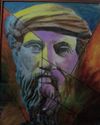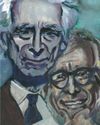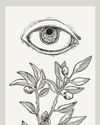
A Martian, I’m told, recently visited a terrestrial garment factory. He was surprised to see that the boss never touched a sewing machine. Even when she asked someone to order new material, it was only after other minions had brought her details of stock levels, work-inprogress, and garment orders. This woman who calls herself ‘the boss’, the Martian concluded, is a mere puppet, her every action being manipulated by these minions. Her only creative input was to make up a story justifying her instructions.
Students of the literature about the mind may recognize this fable as a metaphor for the way a certain school of neuroscientists describe the conscious mind as a helpless bystander manipulated by unconscious processes – because conscious decisions are always preceded by unconscious activity that shapes the conscious outcome.
Of course, we know the factory boss was only given the information she needed because she’d previously asked for it. I want to argue that, in the same way, the pre-conscious inputs to conscious processes very often arise only because previous conscious activity has served to define issues for unconscious processes to answer. Thus the ‘pre-conscious’ is also ‘postconscious’.
Choosing Words
Consider what happens when we choose a word. Many accounts of this process are inadequate.
This story is from the October/November 2024 edition of Philosophy Now.
Start your 7-day Magzter GOLD free trial to access thousands of curated premium stories, and 9,000+ magazines and newspapers.
Already a subscriber ? Sign In
This story is from the October/November 2024 edition of Philosophy Now.
Start your 7-day Magzter GOLD free trial to access thousands of curated premium stories, and 9,000+ magazines and newspapers.
Already a subscriber? Sign In

FALLING DOWN
Thomas R. Morgan considers how personal identity is maintained, and how it is lost.

Pythagoras (570-495 BCE)
Daniel Toré looks beyond the mathematician to the philosopher.

Wordsworth & Darwin
Christine Avery wonders whether poetry can help us to deal with science.

Plants & Philosophy
Caroline Deforche sees similarities between gardening and philosophising.

Dr.Gindi sculptor, has a philosophical conversation with Richard Baron about sensation, life, infinity and, you guessed it, sculpture.
Dr. Gindi is one of Switzerland's foremost sculptors, whose work has been exhibited in many countries.

Thomas Aquinas on Extraterrestrial Life
Babatunde Onabajo tells us why Aquinas did not believe in aliens.

The Fire This Time
Tim Madigan on Ray Bradbury, Bertrand Russell and Fahrenheit 451.

Trust, Truth & Political Conversations
Adrian Brockless wants a recognition of human value in political debate.

Philosophy & The Crown
Vincent Di Norcia on monarchy and stability.

Technologists & Ethicists
Stephen L. Anderson laments inadequate moral insight among tech leaders.